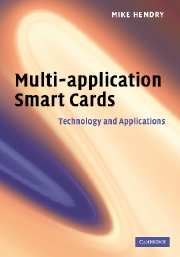Book contents
- Frontmatter
- Contents
- Foreword by Kevin Gillick
- Acknowledgements
- Part I Introduction
- Part II Technology
- 4 Biometrics
- 5 Security and cryptography
- 6 Card technology
- 7 Readers and terminals
- 8 Application selection: the ISO 7816 family
- 9 JavaCard and GlobalPlatform
- 10 Multos
- 11 Other operating systems
- 12 Card management systems
- Part III Business requirements
- Part IV Implementation
- Appendix A Glossary
- Appendix B Further reading
- Appendix C Standards
- Index
- References
10 - Multos
from Part II - Technology
Published online by Cambridge University Press: 11 August 2009
- Frontmatter
- Contents
- Foreword by Kevin Gillick
- Acknowledgements
- Part I Introduction
- Part II Technology
- 4 Biometrics
- 5 Security and cryptography
- 6 Card technology
- 7 Readers and terminals
- 8 Application selection: the ISO 7816 family
- 9 JavaCard and GlobalPlatform
- 10 Multos
- 11 Other operating systems
- 12 Card management systems
- Part III Business requirements
- Part IV Implementation
- Appendix A Glossary
- Appendix B Further reading
- Appendix C Standards
- Index
- References
Summary
History
Multos was originally developed by Mondex International, the developers of one of the world's first electronic purses.
Mondex foresaw that issuers of electronic money would want to allow the e-cash application to reside on any smart card, not just ones issued by financial institutions. Hence, the electronic purse could find itself co-residing with other applications, such as a club membership or a credit–debit function, on the same card. It was also envisaged that applications on the smart card might be updated or added during the life of the card. And to protect the e-cash application from attack by fraudsters or hackers, it was essential that the multi-application smart-card platform must be secure and controlled by the card issuer.
Having worked on the electronic purse card for some years, the banks that owned Mondex could see the wide range of potential applications for the technology and, in particular, for the security functions it could offer. High levels of security, proof of security and tight control by the card issuer were key requirements. The design objectives of Multos were, therefore, fourfold:
A very high security platform;
A platform-independent programming language and application architecture;
The ability for multiple applications to share card memory and data in a secure and controlled way;
The ability to download applications after the card has been issued, but without the risk that unauthorised applications could be loaded or could corrupt existing applications.
Multos products first appeared in 1996, and in the same year the Maosco consortium was formed (by smart-card manufacturers and integrators, telcos and payment-card schemes MasterCard and American Express) to manage the specifications and to promote the operating system as an open standard.
- Type
- Chapter
- Information
- Multi-application Smart CardsTechnology and Applications, pp. 90 - 97Publisher: Cambridge University PressPrint publication year: 2007



